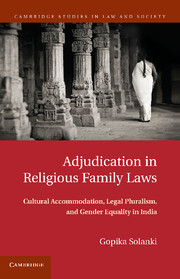 Adjudication in Religious Family Laws
Adjudication in Religious Family Laws Book contents
- Frontmatter
- Contents
- List of Figures
- List of Tables
- Preface
- Acknowledgments
- Abbreviations
- Glossary
- 1 Introduction
- 2 The Shared Adjudication Model
- 3 State Law and the Adjudication Process
- 4 Making and Unmaking the Conjugal Family
- 5 Juristic Diversity, Contestations over “Islamic Law,” and Women's Rights
- 6 Conclusion
- Appendix
- Bibliography
- Index
- CAMBRIDGE STUDIES IN LAW AND SOCIETY
4 - Making and Unmaking the Conjugal Family
The Administration of Hindu Law in Society
Published online by Cambridge University Press: 03 May 2011
- Frontmatter
- Contents
- List of Figures
- List of Tables
- Preface
- Acknowledgments
- Abbreviations
- Glossary
- 1 Introduction
- 2 The Shared Adjudication Model
- 3 State Law and the Adjudication Process
- 4 Making and Unmaking the Conjugal Family
- 5 Juristic Diversity, Contestations over “Islamic Law,” and Women's Rights
- 6 Conclusion
- Appendix
- Bibliography
- Index
- CAMBRIDGE STUDIES IN LAW AND SOCIETY
Summary
Introduction
In this chapter, I discuss the dynamic interaction between the state and substate actors such as caste panchayats, women's organizations, political parties, and other informal actors in adjudication processes under Hindu law. The chapter is organized into three sections. The first section establishes the sociohistorical processes and organizational contexts of the adjudicative mechanisms practiced by three castes that are placed differentially in the caste hierarchy among Hindus in Mumbai and whose practices point to the considerable organizational diversity and ambiguity in the nature of justice across castes. This section also delineates the role played by laws and customs in engendering these caste spheres. The second section of the chapter focuses on the micropolitics of adjudication, draws on experiences of litigants, and examines the nature of the interactions between state law and nonstate laws. This section also compares the adjudicative processes across castes and discusses the variances in the cases. The third section also discusses the role of other formal and informal authorities in the adjudication of Hindu law in society.
The body of literature suggests two forms of organizations within castes. Caste associations are seen to be voluntary, broad-based coalitions of differing castes that align for common goals in democratic participation (Bailey1963; Hardgrave 1969; Rudolph and Rudolph 1967; Washbrook 1975). Caste panchayats are decision-making bodies dominated by caste elders to solve internal caste disputes (Rudner 1994; Verma 1979), and these councils often decide on cases of marriage and divorce.
- Type
- Chapter
- Information
- Adjudication in Religious Family LawsCultural Accommodation, Legal Pluralism, and Gender Equality in India, pp. 175 - 266Publisher: Cambridge University PressPrint publication year: 2011


